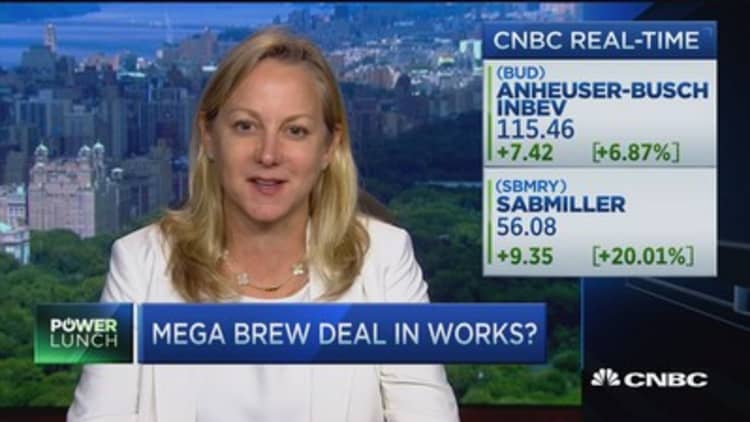The beer business is buzzing over a potential mega-deal, after Anheuser-Busch InBev confirmed it has approached SABMiller's board of directors regarding a combination of the two companies, stating its intention to work with SABMiller's board "toward a recommended transaction."
The company's statement follows an earlier response to "press speculation" from SABMiller, in which it said it will "review and respond as appropriate to any proposal which might be made."
An AB InBev acquisition of SABMiller has been the subject of much speculation within the beer industry for the last several years. But now that it's officially on the table there's a lot to be done, and much of it needs to happen quickly.
According to United Kingdom law, the public acknowledgement of AB InBev's overtures toward SABMiller means the clock is ticking. AB InBev must make its offer on or before Oct. 14, or it must walk away from the deal (provided SABMiller does not grant an extension to continue any talks).
AB InBev must also hit the mark with the right price, with analysts putting that figure anywhere between 38 to 45 British pounds per share. That would make it the largest deal in beer business history.
Two prominent SABMiller shareholders will have a significant voice in the process: Altria Group, the tobacco company that owns 27 percent of SABMiller, and the wealthy Santo Domingo family from Colombia, the company's No. 2 shareholder at 14 percent.
According to sources, those stakeholders also have significant SABMiller board representation and may also be represented by the same bankers advising the SABMiller board. They will therefore likely have a strong voice in the structure of the deal, in terms of whether the consideration involves cash, stock or some combination of both.

Assuming the terms of the deal can be worked out in the next few weeks, there is also the issue of what the merged companies would need to divest to gain regulatory approval in various markets across the globe.
While these divestitures won't need to happen within the next 28 days, AB InBev will want to have a rough plan in place for the deal to move forward.
An Anheuser-Busch InBev/SAB Miller combination would create a company with $69 billion in annual revenue and a market value of more than $270 billion. The new entity would control one-third of the world's beer market.
In the United States, an AB InBev and SAB Miller tie-up would create a behemoth in control of 70 percent of the market. It would bring the top four best-selling brands of Bud Light, Coors Light, Budweiser and Miller Lite under one roof.
That's not going to fly with regulators, and SABMiller would almost certainly need to sell its 58 percent stake in MillerCoors, its joint venture in the United States with Molson Coors.
There are also potential regulatory issues in China, where SABMiller has a 49 percent stake in a joint venture with state-owned China Resources Enterprise.
That entity, CRSnow, is the brewer behind Snow, the world's best-selling beer.
"I don't think beer is a strategic asset for the Chinese government, so there is a chance [SABMiller] would keep the Snow assets and have north of a 30 percent market share, possibly 40 percent market share in China, which would be pretty remarkable," said Caroline Levy, beverage analyst with CLSA.
"But there will [surely] be some other divestitures."
Even with divestitures, the benefits of such a deal are significant, with many analysts calling it a "transformational."
An SABMiller acquisition would give AB InBev market-leading positions in regions where beer consumption is still growing, including Africa, and mute the impact of a slowdown in some larger markets.
"As Brazil and China's economies have slowed down, beer consumption has slowed, as well, and puts more pressure to accelerate this deal and get AB InBev back on the growth trajectory," said Ross Colbert, global beverage strategist at Rabobank
CLSA's Levy shared a similar sentiment.
"[AB InBev] are seen as the ultimate cost cutters, and they could strip out a lot of costs from SAB if they succeeded in this transaction," she said. "They are big in Brazil, and the U.S. has been very tricky, and I think part of the reason they need to make this move now is their inherent growth rates are under a lot of pressure."
—David Faber provided additional reporting.




